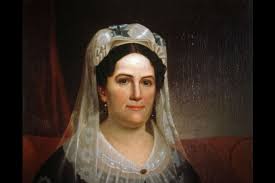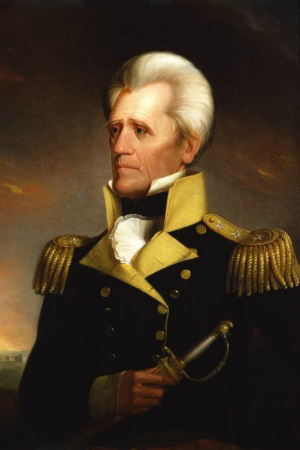The Life and Times of Andrew Jackson
Copyright © Henry J. Sage 2012
Andrew Jackson's life is perhaps the most colorful of the lives of all American presidents,
although Theodore Roosevelt would certainly have a claim to that title.
Andrew Jackson was born on the Carolina frontier, the son of parents who had immigrated from Northern Ireland. Thus he is the first real Irish-American United States President. (John F. Kennedy was the first Irish-Catholic American president whose ancestors came from the Republic of Ireland.) Jackson's life can be described as rough-and-tumble from its earliest days. The Scots-Irish had no love for the British, so it was no surprise that as a teenager Jackson served in the American Revolution. Captured by the British, he was ordered by a British officer to polish his boots, and when Jackson refused, the officer struck him with a sword, leaving a scar on his face. After the Revolution, following the death of his brother and mother, Jackson headed for the Tennessee frontier, where he became a successful lawyer and landowner in the frontier town of Nashville.
 While living in a Nashville boarding house, Jackson met a woman name Rachel Donelson, who happened to be unhappily married to a man who traveled a lot. Jackson's friendship with Rachel became a sore spot for Rachel's husband, and after returning from a trip and sensing something untoward going on between his wife and Jackson, he headed back to Virginia, telling Rachel he was divorcing her. The story of the subsequent marriage between Andrew Jackson and Rachel is murky, but what apparently happened is that they got married before Rachel's divorce was final, and when they discovered that fact, they got married again. When the story came out, they were tainted with the charge of having lived in an adulterous relationship while Rachel was still legally married. Jackson and Rachel adored each other, and any suggestion about Rachel's supposedly colorful past was sure to send Jackson into a rage.
While living in a Nashville boarding house, Jackson met a woman name Rachel Donelson, who happened to be unhappily married to a man who traveled a lot. Jackson's friendship with Rachel became a sore spot for Rachel's husband, and after returning from a trip and sensing something untoward going on between his wife and Jackson, he headed back to Virginia, telling Rachel he was divorcing her. The story of the subsequent marriage between Andrew Jackson and Rachel is murky, but what apparently happened is that they got married before Rachel's divorce was final, and when they discovered that fact, they got married again. When the story came out, they were tainted with the charge of having lived in an adulterous relationship while Rachel was still legally married. Jackson and Rachel adored each other, and any suggestion about Rachel's supposedly colorful past was sure to send Jackson into a rage.
In fact, Jackson was sensitive to anything he considered insulting, even as an attorney in the courtroom. He was involved in a number of brawls, but the most famous altercation involved Andrew Jackson and Charles Dickinson. Following a nasty argument over a bet on a horse race, which escalated out of control, Jackson and Dickinson agreed to a duel. Since the practice was illegal in Tennessee, they headed for nearby Kentucky. Dickinson preceded Jackson to the dueling spot and along the way thrilled observers with his skill as a marksman, shooting bottles off of fences with a pistol at a distance equivalent to that at which he would face Jackson. "Let Jackson beat that!" he would say to the admiring onlookers.
On the morning of the duel Jackson was determined to dispatch his foe. To protect himself, he wore loose clothing to hide the outlines of his slender torso. Knowing that Dickinson's bullet would probably strike him, and not wanting to have his own aim thrown off when he was hit, Jackson decided to let Dickens on have have the first shot. Dickinson fired first, and the bullet struck Jackson in the chest near his heart, breaking two ribs. Never even wincing, Jackson coolly raised his pistol and pulled the trigger, but his pistol was half cocked and didn't go off. Jackson, still in considerable pain from the bullet in his chest, re-cocked the pistol and fired again hitting Dickinson in the groin, a wound from which he bled to death within a few minutes. Jackson's wound was severe, and it took weeks for him to recover, but the charge of having murdered Dickinson followed him for the rest of his life, even though the duel was in theory a "fair fight." Pain from the wound inflicted by Dickinson also followed Jackson to his grave.
Long before his presidency, Jackson was known to many Americans for his military skills. During the War of 1812, Jackson's victory over the British at the Battle of New Orleans was the highlight, and one of the most one-sided battlefield triumphs in American military history. The meaning of the Battle of New Orleans was both symbolic and historic. Jackson's victory was seen as a triumph for America that affirmed the value of "undisciplined" fighters as opposed to the British regulars. It was one of the most one-sided victories ever. Jackson was seen as a man of extraordinary will power, who could accomplish much through the strength of his character.
The popularity of "Old Hickory" lasted and carried him to the White House in 1828. Although Jackson was a wealthy landowner, slave owner, attorney, businessman and successful general, he had common origins, and was thought by many to have been a crude individual. He certainly had a volatile personality and led anything but a calm and quiet existence. Yet based on his heroic defense of New Orleans in 1815, he was a popular hero of the highest order, the second in a series of successful military men who rose to high political office.
 Jackson was best known as a war hero, an Indian fighter and a champion of the ordinary citizen, although when elected president he was a wealthy man of property. Nevertheless, he was a symbol of the new age of democracy—the "age of the common man." He was both an average citizen and an ideal American and was therefore able to draw support from every section and social class. Jackson could be charming, and he was basically honest; there was never any doubt about his courage, either physical or moral. Yet Jackson had reputation as a hotheaded brawler who never forgave enemies. He was not above using that reputation to make an impression on people. (In a famous incident in the White House, he apparently lost his temper and fumed at some unwelcome guests, who fled in horror. When they had gone, he turned to an aide, grinned and said, "They thought I was mad, didn't they?")
Jackson was best known as a war hero, an Indian fighter and a champion of the ordinary citizen, although when elected president he was a wealthy man of property. Nevertheless, he was a symbol of the new age of democracy—the "age of the common man." He was both an average citizen and an ideal American and was therefore able to draw support from every section and social class. Jackson could be charming, and he was basically honest; there was never any doubt about his courage, either physical or moral. Yet Jackson had reputation as a hotheaded brawler who never forgave enemies. He was not above using that reputation to make an impression on people. (In a famous incident in the White House, he apparently lost his temper and fumed at some unwelcome guests, who fled in horror. When they had gone, he turned to an aide, grinned and said, "They thought I was mad, didn't they?")
He was a charismatic but not intellectual leader, highly intelligent, shrewd and practical. A true Westerner at heart, and a slave holder, Jackson resented the North and East. On the other hand, he did not buy into the growing states' rights philosophy that was beginning to grow stronger in that era. He was a Unionist and would probably have opposed secession in 1861, though as a Tennessean, he might have joined the other side. Jackson grew in office of president and made that office more democratic. He did not act as a "dignified chief of state above politics" but rather as a political infighter who saw his role as protecting the people from the excesses of Congress.
Jackson's presidency was one piece of a long struggle over the nature of government power and authority: at which end of Pennsylvania Avenue does the real power reside: In Congress or the White House? Jackson saw the office of President as a protection against the power usurpers of the House, Senate and Supreme Court.
(The recent biography, Andrew Jackson: His Life and Times, by H.W. Brands is a superb account of Jackson's life and accomplishments. An earlier three-volume biography by Robert V. Remini, also excellent, goes into more detail)
When Jackson died, an observer said, “If Andy Jackson decides on heaven, that’s where he’ll go!”
Sites on Andrew Jackson
- Visit Andrew's Jackson's Nashville home, The Hermitage.
- Biographical details of Jackson's life.
- The White House biography of Jackson
| Jeffersonian Home | Jacksonian Home | Expansion & Manifest Destiny |
| Sage American Home | Antebellum America | Updated June 3, 2020 |